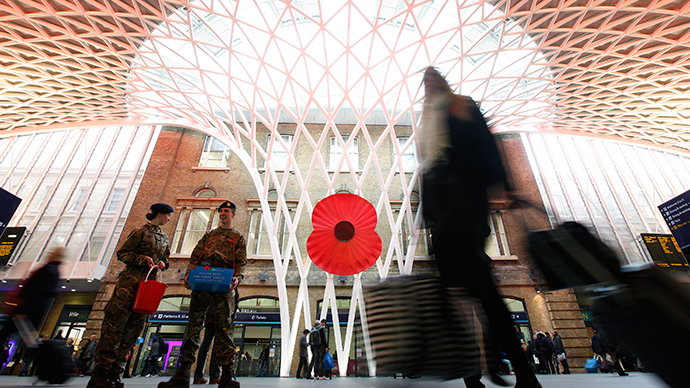Remembrance of horrors past (and present)

Remembrance Day is Britain’s annual commemoration of those who fell fighting the nation’s wars. It is observed each year on the closest Sunday to November 11, the anniversary of Armistice Day, which brought World War I to an end in 1918.
The message embraced on Remembrance Day is that regardless of our differences we are all joined by a common nationality, heritage and history, and that those who fought and died in uniform did so in the interests of the entire nation, and as such are worthy of the entire nation’s admiration, gratitude and honor.
However there is an insidious side to this annual ritual, a ritual that has taken on the mantle of a national shibboleth. It is that ultimately the trumpets, monuments, and fanfare are not designed to mourn the dead, but instead to glorify the nature of their deaths and, by extension, extol the virtues of militarism and the nation’s martial might.
This is even more relevant when we consider Britain’s recent participation in the wars in Iraq and Afghanistan - wars which resulted in a catastrophic loss of civilian life and for whom there is no monument or ritual of remembrance – not forgetting the myriad other colonial wars in places like Malaya, Kenya, Yemen and, closer to home, Ireland.
Indeed the sight of politicians, members of the Royal Family, and other members of the nation’s ruling class laying wreaths at the Cenotaph in Whitehall to commemorate the deaths and slaughter of the untold thousands of primarily working-class men, used as cannon fodder to maintain the class privileges which they and theirs enjoy, is an act of nauseating hypocrisy to behold.

No amount of national propaganda can conceal the truth that lies behind this hypocrisy – namely that Britain’s history as a colonial power has been an ignoble and eminently dishonorable one, and that the apotheosis of militarism which this annual ritual engenders acts as a recruiting sergeant to encourage succeeding generations of young men, starved of opportunity and prospects at home, to join up and likewise be used as cannon fodder in service to the nation’s elite.
Worse, when they come out, and if they are lucky to survive intact, they are typically left to wither on the vine without the necessary support to enable them to integrate back into civilian life. In 2013, British newspaper the Sunday Mirror carried a shocking story revealing that 9,000 British ex-soldiers were officially homeless and made up one in 10 of all those sleeping rough across the UK.
Even when it comes to the one war that Britain was justified in fighting over the past century of the wars and military conflict it has engaged in, World War II against Nazi Germany, there are truths attached that dare not speak their name. The first of these is that were it not for the savage peace terms forced on Germany in the wake of World War I, Hitler’s rise on the back of the destitution endured by millions of Germans would probably never have taken place. The second is were it not for the subsequent years of appeasement that was largely driven by the sympathy and latent support for the Nazis on the part of a significant section of the British ruling class in the 1930s, Hitler would likely have been stopped at a far earlier stage in his ambitions.
This is the ugly reality that lies behind the mask of ritual surrounding Remembrance Sunday. And no amount of fanfare or propaganda can ever completely conceal it.

Remembrance Sunday reminds us that we are a nation and a society suffering from an addiction to war. Breaking this addiction requires that we first undergo a sea change in our attitude to war and how we view those who’ve died in past wars. The liberal bandying around of words such as ‘sacrifice’ and ‘heroism’ at this time of year, usually by well fed, privileged politicians and commentators who’ve probably never experienced as much as a punch in the mouth in their lives, much less combat, reveals an atrocious lack of understanding of the terror these young men experience in places like Afghanistan and Iraq.
The notion that an 18-year-old from an underprivileged background joins the military with the intention to sacrifice his life for his country is a lie. They join up looking to escape the drab and dim prospects offered them at home, seduced by the illusion of excitement and adventure. At 18 or 19 you think you are invincible, imbued with a sense of your own immortality, and as such malleable in the hands of an establishment looking to exploit the lack of economic prospects at home.
No amount of training could ever prepare these young men for the horrors of war, for the sight of their mates being blown apart beside them, the sight of women and children slaughtered in an airstrike or by accident; and no amount of bugles and parades could ever compensate those who return maimed and/or psychologically damaged as a consequence, whereupon they are left to the mercy of charity.
War should be made a crime, and those who instigate it should be punished as criminals. It does not determine who is right, only who is left.
Remembrance Day merely reminds us how far we have yet to travel before we can lay claim to the word ‘civilized’.
The statements, views and opinions expressed in this column are solely those of the author and do not necessarily represent those of RT.
The statements, views and opinions expressed in this column are solely those of the author and do not necessarily represent those of RT.













